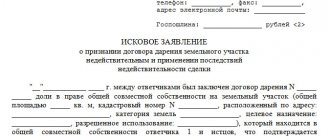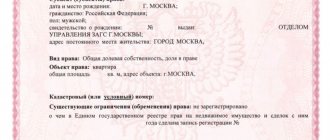The concept of deed of gift
A deed of gift is a document according to which the donor transfers real estate or a valuable thing for free use to the donee. Features of donation transactions are regulated by Ch. 32 Civil Code of the Russian Federation:
- The procedure must be previously agreed upon by both parties. They need to agree on what exactly will be donated, on what day they will conclude the donation agreement and have it certified by a notary.
- The recipient has the right to refuse the gift. If a deed of gift was issued for it, the refusal is also drawn up in writing.
- A gift agreement must be concluded if the value of movable property exceeds 3,000 rubles, or real estate is donated: an apartment, a garage, a house, a plot, etc.
- If real estate is transferred as a gift, the agreement is registered with Rosreestr in the presence of both parties.
Important! The donor may cancel the gift agreement at any time if the recipient has made an attempt on his life and health or on his relatives. If the court finds that the cause of death was the criminal actions of the donee, the agreement is also canceled, and the previously donated property is distributed among the heirs of the deceased.
The entire donation procedure is as follows:
- The parties agree on when, where and what will be given, when and with which notary they will conclude the agreement.
- A state fee is paid for certification of the contract. If the notary is also involved in its preparation, an additional notary fee is paid.
- The donee and the donor come to Rosreestr if the subject of the gift is real estate. There documents are submitted to register ownership.
- A few days later, the donee visits Rosreestr to receive an extract, where he will be indicated as the new owner.
Functions of deed of gift
The main task of the deed of gift is to formalize the donation transaction. Thanks to it, the new owner of the property will be able to fully use it and, if necessary, confirm that the gift was purchased legally.
Many people do not know which is better - a deed of gift or a will, and also mistakenly assume that the gift agreement can indicate the possibility of transferring real estate into ownership only in the event of the death of the donor. A document containing such a condition is considered void.
There is a fundamental difference between donation and inheritance: in the first case, the transfer of ownership is possible only during the life of the owner, and in the second, property is distributed only after his death.
Important! You can get an answer to one more question - if there is a deed of gift, is it necessary to enter into an inheritance - in the Civil Code of the Russian Federation. It clearly states that when the donee manages to transfer the property to himself under a gift agreement, it becomes his full property, so entering into an inheritance is relevant if he is included in the circle of legal successors and other things that do not belong to him are inherited.
Options for the legal regime of spouses' property
Family relationships directly affect the property rights and responsibilities of spouses. As a general rule, any property assets acquired by citizens during marriage become their joint property.
Joint ownership of property, including residential real estate, is characterized by the following features:
- paid and gratuitous disposal of real estate can only be carried out by common consent and decision of both partners;
- The division of the apartment and the allocation of separate shares for each of the owners can be carried out at the request of any partner.
To change the standard rule on joint ownership, citizens must include this condition in the contracts under which they acquire property assets.
In addition to joint ownership, real estate may belong to partners in other forms of ownership provided for by civil and family law:
- shared form - each of the owners owns a certain share in the common law, the amount of which is established by mutual agreement of the parties;
- personal form - housing that belonged to the newlyweds during the period of marriage, as well as apartments that the spouses received during the marriage through gratuitous transactions (donation, inheritance, privatization agreement);
- separate form - established as a result of a change in the joint form of ownership by concluding a mutual agreement or a marriage contract.
Each of these forms of ownership is characterized by different features of donation, which will affect the obligation of the parties to formalize consent to carry out this gratuitous transaction.
Inheritance procedure
According to the law, inheriting an apartment using a deed of gift is impossible due to the fact that this document involves the transfer of ownership only during the life of the donor. If a gift agreement was drawn up but not registered with Rosreestr, the property indicated in it as a gift passes into the general inheritance estate.
If we are talking about a deed of gift for an apartment after death, when it was drawn up and registered properly, then subsequently the heirs will not be able to claim it - the property will belong only to the gifted person.
Thus, inheritance under a deed of gift is impossible. To transfer real estate to inheritance, the testator must draw up a will. There is another option - entering into inheritance by law. There are significant differences between these two methods:
| Will | Inheritance by law |
| Any person who is not a relative can receive property | Real estate is inherited by relatives of 1-3 degrees of kinship, and in the absence of such, by subsequent ones. If there are no relatives of the first degree, those of the second degree enter into inheritance. |
| The citizen draws up a document with a notary, where he indicates to whom exactly and in what shares the property is transferred | There is no will, inherited property is distributed evenly among all legal successors |
Another popular question is to whom the donated apartment is transferred after the death of the donee. According to the law, this property is the full property of the gifted person, therefore, in the event of his death, the right to it arises from the heirs. The donor's relatives cannot claim it.
Let's look at a detailed example:
Ignatov O.L. gives the house to his friend N.N. Maksimov. The transaction was completed on June 16, 2017, 2 days later the parties submitted documents to the MFC to re-register ownership. Maksimov received an extract from the Unified State Register on June 25, 2017, and a week later he dies. He is survived by his wife and child – they receive this property by inheritance. Alferov E.V. cannot claim it, despite the fact that the house was originally bought with his money - there is a deed of gift, and the property legally belongs to the Maximov family.
How much does a notary cost?
Most legal actions come at a cost. The legal relationship under consideration is no exception. The cost of this service is determined by the regional notary chamber.
Private notaries can offer their own prices. Therefore, in this case, you should ask in advance how much it will cost.
Of course, in the capital and largest cities of Russia, it will cost slightly more than in the provinces. However, if we take into account all regional tariffs, then this document can cost 1800 rubles, not taking into account the city of Moscow.
How a donated apartment becomes an inheritance
Drawing up a deed of gift means that after registering the property, the former owner loses the right to it, and the new owner can independently dispose of it: gift it to other people, sell, exchange, bequeath.
The entire procedure for inheriting an apartment received by gift, from the moment of drawing up the contract to receiving the certificate of inheritance, looks like this:
- One citizen enters into a gift agreement with another. The gifted person re-registers the property together with the donor in Rosreestr, and subsequently dies.
- Relatives of the gifted person enter into the inheritance by submitting an appropriate application for acceptance within 6 months after the death of the testator.
- If inheritance is made according to a will, the inheritance is received by the persons specified in it. When inheriting by law, property is distributed in equal shares among all relatives of the corresponding degree of relationship.
- If a will has been drawn up, but there are persons entitled to an obligatory share in the inheritance, they receive it in the same amount as in the case of inheritance by law, even if this causes a reduction in the shares of other persons. You will have to share with them, regardless of the contents of the testamentary document.
Six months after the opening of the inheritance case, the notary issues a certificate of the right to inheritance. With it, the assignee goes to Rosreestr and re-registers the property in his name.
Final provisions: 5 basic rules
If a person has decided to donate part or all of the marital property, it should be discussed with the other party, including after a divorce, if it has not previously been divided, by obtaining verbal permission.
Then you need to observe a number of points:
- Drawing up an agreement on your own is sometimes beyond the power of a legally inexperienced person. agreements can be found here.
- Choose a notary where it will be drawn up and find out the price of the service accordingly.
- Carefully read the text of the document, eliminating errors, inaccuracies and blots from it.
- Have it with you when registering with Rosreest.
- Weigh everything carefully before deciding to enter into a transaction.
There are cases when consent to conclude a deed of gift is not impossible to obtain. There are ways out of this unfavorable situation for the donor that should not be neglected.
- Try to convince through negotiations to give the necessary permission.
- Select part of the joint property and donate it. Draw up a document on the disposal and use of shares, and on its basis make a gift.
By acting in this way, you can avoid the problem that has arisen. The second half will not prevent the allocation of shares of the property (apartment), since according to the law the spouses dispose of it equally. In the case of housing, when designating shares, the apartment is sold, and the funds are divided in half, within the designated parts.
Is it possible to make a donation after the death of the owner?
Another frequently asked question concerns what to do if there is a deed of gift - who has the right to inheritance? Here everything depends on the re-registration of ownership: if it was completed before the death of the donor, the donee is considered the owner. If there is a gift agreement and there is no registration, the property is included in the general inheritance mass, and the donee will not be able to use it.
If the owner of a home wants it to belong to a specific person only after his death, it is necessary to draw up not a deed of gift with such a condition, but a will. If a clause on the transfer of ownership only after the death of the owner is included in the gift agreement, the document is considered void.
Statement
To enter into an inheritance, the applicant must submit an application to a notary's office.
The document contains the following information:
- name of the notary office;
- information about the beneficiary (full name, place of residence);
- reference to the presence of a relationship with a deceased citizen;
- mention of a will;
- data of other heirs;
- the essence of the successor's request;
- date of application;
- applicant's signature.
Sample application for acceptance of inheritance
Donated apartment after the death of the donee
It is possible to return an apartment given to another person after his death only if the deed of gift contains the corresponding clause. If it is not there, the heirs of the donee will receive the property.
There is an alternative option - challenging the deed of gift through the court. This is possible if it is proven that the execution of the agreement resulted in a significant deterioration in the financial or property situation of the donor.
To understand the peculiarities of transferring ownership of an apartment by deed of gift, to whom it is inherited and other nuances, it is enough to familiarize yourself with a practical example:
Alferov E.V. owns a three-room apartment. In May 2021, he decided to give it to his daughter. He also has a son from a previous marriage. The purpose of concluding a gift agreement is to leave another child without an inheritance, because There has been no contact with him for several years.
In June 2021 Alferov E.V. dies, and his son decides to challenge the deed of gift. To do this, he goes to court, indicating that, based on the degree of relationship, he has the same rights as his sister and could have inherited the apartment if the gift agreement had not been drawn up.
The court rejected this request due to insufficient grounds for canceling the transaction, because it was committed at the will of the former owner, and the donated property was acquired by him jointly with his wife, with whom he was married at the time of death.
Is the gift agreement terminated?
Termination of a deed of gift at the initiative of the donor is carried out only in court and if there are legal grounds:
- Deterioration of the financial situation of the former owner.
- Inappropriate handling of property by the gifted person, if this threatens its destruction or loss.
- Death of the gifted person, if this clause was specified in the contract.
As for termination at the request of the donee, such transactions are not contested in court - simply re-registration of documents in Rosreestr is sufficient.
The procedure for challenging a deed of gift
Citizens are often interested in the question of whether an apartment under a deed of gift is disputed after the death of the donee or donor. It all depends on the circumstances of a particular case. For example, persons interested in receiving an inheritance can apply for annulment of a transaction if the real estate could be included in the inheritance mass: children, grandchildren, wives, husbands. In this case, the degree of relationship of applicants for property must be taken into account.
Important! After a divorce, a husband cannot claim his wife’s personal property. An equivalent rule also works in the opposite direction: divorce means the termination of all obligations, incl. and property, if a petition for its division was not previously submitted within the established time frame. Former spouses retain only the obligation to raise and support their common children.
Who can challenge a deed of gift
If interested parties have information about the illegality of the transaction or other grounds, they can challenge the registration of the deed of gift. The circle of such persons includes any relatives, regardless of degree (only the order is taken into account), as well as ex-wives if the transaction affects the legitimate interests of a child common to the donor.
State and municipal bodies also have the right to appeal to challenge property transactions if they have learned of a violation of the rights of minors or incompetent citizens (representatives of guardianship or social protection authorities, etc.).
Grounds for challenge
In addition to how a donated apartment is inherited and whether it can be annulled, it is important to know the grounds for challenging:
- The donor being under the influence of alcohol or drugs at the time of execution of the transaction, incapacity. According to the law, transactions on behalf of incapacitated citizens are made on their behalf only by authorized representatives. Here you will need evidence: a court decision, audio or video recordings, witness testimony.
- Concluding a gift agreement under the influence of moral or physical pressure. In this case, after examining the evidence, the court will cancel the deed of gift, and the guilty person will be brought to criminal or administrative liability depending on the severity of the act.
- Absence of written consent to the donation from the second spouse, if the gift was made out of property acquired jointly during the marriage.
Important! When going to court to challenge, you will need any evidence, even indirectly indicating the illegality of the transaction.
Grounds for recognizing a deed of gift as void
A deed of gift is considered void if it is established that it was drawn up in violation and has no legal force. This usually happens in the following cases:
- The gift agreement is filled out incorrectly: the details of the parties or the item (gift) are not indicated; content of blots and errors that significantly distort information.
- The sham of the transaction: the donation was formalized, but in fact the real estate was not registered with Rosreestr. This occurs when the donor wants to hide his property status or prevent others from inheriting property.
- Pretense of the transaction: in order to be exempt from paying state duties and taxes on income, sellers act as donors, and buyers act as recipients.
Is it possible to cancel a notarized consent of a spouse and how?
Current legislation does not provide for the cancellation of an already drawn up document. If the spouse decides to change his decision, then she must notify the notary in writing, and accordingly the other party. However, this will play a role, provided that the deal has not yet been concluded and has not undergone state registration.
Provided that the agreement is drawn up and has passed state registration, the party who decided to revoke its consent can go to court. During the trial, the plaintiff must prove to the judge that there were sufficiently serious reasons to change his decision.
As practice shows, it is extremely difficult to do. There are very few similar precedents when the filed claim was satisfied. The court usually takes the side of the defendant, especially when it comes to children acting as the donee.
Time limits for challenging
It all depends on the specific circumstances:
- If the reason for the challenge is the bankruptcy of the donor, he is given six months from the date of execution of the contract.
- In other cases - three years from the moment the donor became aware of the violation of his rights.
If the donee exerted pressure on the donor, the period begins to count from the moment the illegal actions cease. If a citizen decided to challenge the transaction, but was unable to do so on time, he has the right to petition for the restoration of the deadlines through the court if there are good reasons why he did not appeal to challenge it in a timely manner: serious illness, living in another country, being on a business trip, lack of information on the alienation of property.
The deed of gift is issued on a gratuitous basis during the life of the donor. After his death, only his heirs can receive the property. A gift agreement with the condition of transfer of ownership only in the event of the death of the owner is recognized as void and has no legal force. If it is drawn up according to all the rules, and after registering the property the gifted person dies, his relatives will be able to transfer everything to themselves in the order of inheritance.











